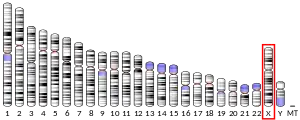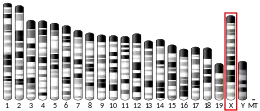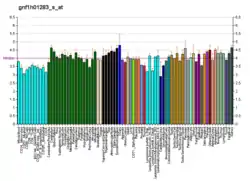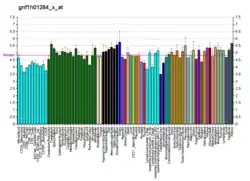Aristaless related homeobox
Aristaless related homeobox is a protein that in humans is encoded by the ARX gene.[5]
Function
This gene is a homeobox-containing gene expressed during development. The expressed protein contains two conserved domains, a C-peptide (or aristaless domain) and the prd-like class homeobox domain. It is a member of the group-II aristaless-related protein family whose members are expressed primarily in the central and/or peripheral nervous system. This gene is involved in CNS and pancreas development.[5]
Clinical significance
Mutation in the ARX gene are associated with X-linked intellectual disability, lissencephaly, as well as hypoglycemia (in mice).[5]
See also
References
- GRCh38: Ensembl release 89: ENSG00000004848 - Ensembl, May 2017
- GRCm38: Ensembl release 89: ENSMUSG00000035277 - Ensembl, May 2017
- "Human PubMed Reference:". National Center for Biotechnology Information, U.S. National Library of Medicine.
- "Mouse PubMed Reference:". National Center for Biotechnology Information, U.S. National Library of Medicine.
- "Entrez Gene: ARX aristaless related homeobox".
Further reading
- Mulley JC, Kerr B, Stevenson R, Lubs H (1992). "Nomenclature guidelines for X-linked mental retardation". Am. J. Med. Genet. 43 (1–2): 383–91. doi:10.1002/ajmg.1320430159. PMID 1605216.
- Häne B, Schroer RJ, Arena JF, et al. (1997). "Nonsyndromic X-linked mental retardation: review and mapping of MRX29 to Xp21". Clin. Genet. 50 (4): 176–83. doi:10.1111/j.1399-0004.1996.tb02622.x. PMID 9001795. S2CID 33109092.
- Suri M (2005). "The phenotypic spectrum of ARX mutations". Developmental Medicine & Child Neurology. 47 (2): 133–7. doi:10.1017/S001216220500023X. PMID 15707237.
- Partington MW, Mulley JC, Sutherland GR, et al. (1988). "X-linked mental retardation with dystonic movements of the hands". Am. J. Med. Genet. 30 (1–2): 251–62. doi:10.1002/ajmg.1320300127. PMID 3177452.
- Schutz CK, Ives EJ, Chalifoux M, et al. (1996). "Regional localization of an X-linked mental retardation gene to Xp21.1-Xp22.13 (MRX38)". Am. J. Med. Genet. 64 (1): 89–96. doi:10.1002/(SICI)1096-8628(19960712)64:1<89::AID-AJMG16>3.0.CO;2-O. PMID 8826457.
- Holinski-Feder E, Golla A, Rost I, et al. (1996). "Regional localization of two MRX genes to Xq28 (MRX28) and to Xp11.4-Xp22.12 (MRX33)". Am. J. Med. Genet. 64 (1): 125–30. doi:10.1002/(SICI)1096-8628(19960712)64:1<125::AID-AJMG21>3.0.CO;2-O. PMID 8826462.
- Claes S, Gu XX, Legius E, et al. (1996). "Linkage analysis in three families with nonspecific X-linked mental retardation". Am. J. Med. Genet. 64 (1): 137–46. doi:10.1002/(SICI)1096-8628(19960712)64:1<137::AID-AJMG24>3.0.CO;2-N. PMID 8826464.
- Jemaa LB, des Portes V, Zemni R, et al. (2000). "Refined 2.7 centimorgan locus in Xp21.3-22.1 for a nonspecific X-linked mental retardation gene (MRX54)". Am. J. Med. Genet. 85 (3): 276–82. doi:10.1002/(SICI)1096-8628(19990730)85:3<276::AID-AJMG18>3.0.CO;2-I. PMID 10398243.
- Hamel BC, Smits AP, van den Helm B, et al. (2000). "Four families (MRX43, MRX44, MRX45, MRX52) with nonspecific X-linked mental retardation: clinical and psychometric data and results of linkage analysis". Am. J. Med. Genet. 85 (3): 290–304. doi:10.1002/(SICI)1096-8628(19990730)85:3<290::AID-AJMG21>3.0.CO;2-H. PMID 10398246.
- Blair HJ, Reed V, Gormally E, et al. (2000). "Positioning of five genes (CASK, ARX, SAT, IMAGE cDNAs 248928 and 253949) from the human X chromosome short arm with respect to evolutionary breakpoints on the mouse X chromosome". Mamm. Genome. 11 (8): 710–2. doi:10.1007/s003350010141. PMID 10920247. S2CID 675465.
- Strømme P, Mangelsdorf ME, Shaw MA, et al. (2002). "Mutations in the human ortholog of Aristaless cause X-linked mental retardation and epilepsy". Nat. Genet. 30 (4): 441–5. doi:10.1038/ng862. PMID 11889467. S2CID 12822090.
- Bienvenu T, Poirier K, Friocourt G, et al. (2003). "ARX, a novel Prd-class-homeobox gene highly expressed in the telencephalon, is mutated in X-linked mental retardation". Hum. Mol. Genet. 11 (8): 981–91. doi:10.1093/hmg/11.8.981. PMID 11971879.
- Strømme P, Mangelsdorf ME, Scheffer IE, Gécz J (2002). "Infantile spasms, dystonia, and other X-linked phenotypes caused by mutations in Aristaless related homeobox gene, ARX". Brain Dev. 24 (5): 266–8. doi:10.1016/S0387-7604(02)00079-7. PMID 12142061. S2CID 32508324.
- Scheffer IE, Wallace RH, Phillips FL, et al. (2002). "X-linked myoclonic epilepsy with spasticity and intellectual disability: mutation in the homeobox gene ARX". Neurology. 59 (3): 348–56. doi:10.1212/wnl.59.3.348. PMID 12177367. S2CID 46362550.
- Ohira R, Zhang YH, Guo W, et al. (2003). "Human ARX gene: genomic characterization and expression". Mol. Genet. Metab. 77 (1–2): 179–88. doi:10.1016/S1096-7192(02)00126-9. PMID 12359145.
- Turner G, Partington M, Kerr B, et al. (2003). "Variable expression of mental retardation, autism, seizures, and dystonic hand movements in two families with an identical ARX gene mutation". Am. J. Med. Genet. 112 (4): 405–11. doi:10.1002/ajmg.10714. PMID 12376946.
- Frints SG, Froyen G, Marynen P, et al. (2003). "Re-evaluation of MRX36 family after discovery of an ARX gene mutation reveals mild neurological features of Partington syndrome". Am. J. Med. Genet. 112 (4): 427–8. doi:10.1002/ajmg.10628. PMID 12376949.
- Kitamura K, Yanazawa M, Sugiyama N, et al. (2002). "Mutation of ARX causes abnormal development of forebrain and testes in mice and X-linked lissencephaly with abnormal genitalia in humans". Nat. Genet. 32 (3): 359–69. doi:10.1038/ng1009. PMID 12379852. S2CID 6666397.
External links
- aristaless+related+homeobox+protein,+human at the U.S. National Library of Medicine Medical Subject Headings (MeSH)
- Human ARX genome location and ARX gene details page in the UCSC Genome Browser.
This article incorporates text from the United States National Library of Medicine, which is in the public domain.
This article is issued from Wikipedia. The text is licensed under Creative Commons - Attribution - Sharealike. Additional terms may apply for the media files.





